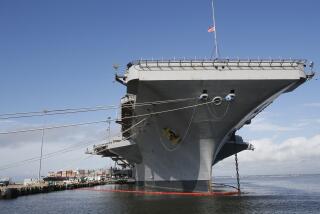Town Rolls Out Unwelcome Mat for ‘Ghost Fleet’
- Share via
HARTLEPOOL, England — Plans to bring aging U.S. Navy vessels here to be dismantled are triggering strong opposition in this old shipping town, with many fearing that the environmental risks outweigh any economic boost.
In its Victorian heyday, Hartlepool proudly built the ships of a global empire. That empire is long gone, as are the shipyard jobs. But residents say they don’t want to be a “dumping ground for the world” -- and are skeptical that the new shipyard jobs will go to locals anyway.
“There’s no need for them to come here,” said June Ryder, a 63-year-old retiree. “We’ve got a lot of muck about here already. Surely America can deal with them on its own.”
Plans to scrap 13 ships from the “Ghost Fleet” of retired U.S. Navy vessels were thrown into limbo last week when Britain’s High Court ruled they could not be dismantled in England until legal challenges by environmentalists are heard next month.
The government says that means four rusting ships already crossing the Atlantic -- two just days away from this port town on the mouth of the River Tees in northern England -- should return to the United States.
When, or if, that will happen remains in doubt. Environment Secretary Margaret Beckett said that although the government “believes that in the circumstances, it would be preferable for the ships to be returned to the United States while the regulatory issues are resolved,” she accepted U.S. contentions that turning them back would be impractical. She said the two lead ships would be stored temporarily instead.
Negotiations are under way to see whether two more ships that have set sail for Britain could be turned back, she said.
In Washington, the Environmental Protection Agency said it was working with the State and Defense departments to resolve the conflict.
Robyn Boerstling, spokeswoman for the U.S. Maritime Administration, which manages the retired vessels, said the ships have all the necessary permits from U.S. and British agencies.
“We are continuing to positively work with our partners and the U.K. with the hope of reaching a mutually acceptable resolution,” she said.
The environmental group Friends of the Earth says the first two ships, the World War II-era auxiliary oil tankers Canisteo and Caloosahatchee, each contain 34.1 tons of non-liquid polychlorinated biphenyls, which were used as electrical insulators but are suspected of causing cancer, and 61 tons of asbestos.
The two others, the Compass Island and the Canopus, contain even more of the contaminants, the group says.
The vessels are among nearly 100 ships, many more than 50 years old, anchored in Ft. Eustis, Va., as part of the U.S. Navy’s Reserve Fleet. The fleet has been an environmental concern in Virginia for years, and nearly 70 ships are considered obsolete and ready to be scrapped.
Able U.K. Ltd., the British company hired to dismantle the ships, disputes the environmental risk.
Spokesman Peter Dodson said that for years the company has safely dismantled oil rigs that “contain a great deal more hazardous material than these ships could ever contain.”
“The facility at Hartlepool is regarded as one of the best in the world,” he said.
The company says dismantling the ships will bring 200 jobs to an area that has endured decades of economic decline. The last Hartlepool shipyard closed in the 1960s. Most of the steelworks, the town’s other major employer, shut down in the 1970s and ‘80s.
The docks that once built trawlers, cargo boats and passenger steamships now house a museum and restored “Historic Quay” aimed at tourists. Several supermarkets nearby are among the town’s biggest employers.
Environmental campaigners say that whatever the economic benefits, the ships’ pollution risk is too great, especially in an area already scarred by heavy industry. They say Teesside, home to a nuclear power plant and chemical factories, has rates of asthma and childhood leukemia well above the national average.
For some, the “ghost ships” are the last straw.
“People just don’t want them here,” said Neil Gregan, one of three Hartlepool residents whose legal challenge sparked the High Court ruling. “They’re just sick to death of it. We shouldn’t be a dumping ground for the world.”
In his ruling, High Court Judge Maurice Kay said he would hear the challenges beginning Dec. 8. Until then, no work should take place on the ships, “except for measures to make and keep them safe.”
The Environment Agency, a government watchdog group, says Able U.K.’s license to scrap the ships is invalid because the firm does not have permission to build a dry dock in Hartlepool.
Able U.K. says it is talking to British and American authorities to try to resolve the legal wrangling. Environmentalists are pressing the two countries to turn the ships around.
More to Read
Sign up for Essential California
The most important California stories and recommendations in your inbox every morning.
You may occasionally receive promotional content from the Los Angeles Times.













